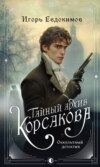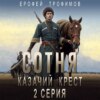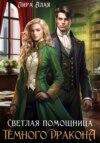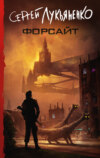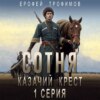Читать книгу: «Sweet Mace: A Sussex Legend of the Iron Times», страница 7
How Master Peasegood entertained his Friend
Master Joseph Peasegood’s little parsonage was a humble quiet spot, and accorded well with the moderate income he received as clerk of Roehurst. There were four rooms, and the roof was thatched over the bedchamber casements, which looked like two bright eyes peering from beneath a pair of overhanging brows. There was a pretty garden, in which the parson often worked, sheltered from the lane by a thick hedge, beneath which was his favourite seat, where he sat and read, with a rustic table before him, and a cherry-tree overhead to shade him from the sun. It was a noble cherry-tree, that bore the blackest and juiciest of fruit, though the parson never ate it, the birds taking all the trouble off his hands.
Master Peasegood was standing at his door, looking very red and warm, for he had been having a verbal encounter with Mistress Hilberry, his thin acid housekeeper and general servant in one.
It began in this wise, the lady being, according to her own account, the most humble and unpresuming of women, but all the same taking upon herself to say things that a less unpresuming person would not have dared.
“I don’t say anything master,” she had exclaimed sharply, “because it would be impertinence in me, but I can’t help thinking that Sir Thomas and Master Cobbe, and all the principal people, will be annoyed to see you back-sliding in this way.”
“Tut – tut – thou silly woman,” said the parson. “Father Brisdone is a good and worthy man, and I may convert him to the right faith.”
“Mind he does not convert thee, master,” said the housekeeper. “These priests are as cunning as old sin. Why, I know on good authority that he’s made very welcome at the Pool-house, and if they don’t mind he’ll carry ’em all to Rome.”
“Not this hot weather, poor things, I hope,” said Master Peasegood. “It’s warm enough here; I don’t know what it would be there.”
“Much hotter, I know,” said the woman, meaningly, as she went on spreading the table with the requisites for a meal – cold pink bacon, a tempting loaf, rich yellow butter, and a couple of ale-horns, with other requisites for the evening repast.
Master Peasegood had an angry reply upon his lips, but he wiped it off with his handkerchief, and walked to the window to see if his expected guest was on the way, while Mistress Hilberry went on talking.
“They’ve seen the lights again, Master Peasegood.”
“Tut, woman: fie on thee! How can you believe such things.”
“Because I’ve seen them myself, sir,” said the woman, tartly. “Strange ungodly lights dancing up and down, and moving through the forest, and Mistress Croftly and others have seen them since.”
“Marshy exhalations, luminous vapours, terrestrial lamps, Mistress Hilberry.”
“I daresay they be, sir,” said the woman with asperity. “It don’t matter to me what you call them, but they’re spirits, and just a year ago, about this time, Martin Lee was struck down by one of them with a noise like thunder. He was an ailing man for a twelvemonth after, shivering regularly at times when he should have been sound and well.”
“Yes, I dare say,” said Master Peasegood. “Hah! here he is.”
He waddled down to the garden-gate, to open it for a thin, pale, grey man in a priest’s cassock, who grasped his hand warmly, and then with a scared, hunted look in his eye, which made him glance uneasily around, as if in search of danger, he accompanied Master Peasegood into the parlour, where Mistress Hilberry received them with a portentous sniff.
“Peace be with thee, my daughter,” the new-comer said, softly; but Mistress Hilberry seemed disposed to declare war, for she snorted, turned on her heel, and left the room with a good deal of rustling and noise.
The visitor looked pained as his eyes sought those of his host in an inquiring way.
“Only the weaker vessel,” said Master Peasegood, laughing. “Never heed her, Father Francis. She tells me thou wilt convert me, and I tell her I am going to convert thee. I’m glad to see you; but, ah!” he cried, holding up a warning finger, “thou hast been fasting over much. Quelling the spirit in us is one thing, making the body weak and sick another. Sit down, man, and fall to. We’ll have a long and cosy evening, and discuss politics and the matters of the world.”
He placed a chair for his guest, smiling pleasantly upon him the while, and then a goodly jug of ale being brought in by Mistress Hilberry, the two clerical friends made a hearty meal, after Father Brisdone had blessed the food.
“I ought not to eat this after your blessing,” said Master Peasegood, laughing, “but I shall. And now, good Father Francis, before we shelve religious matters for the evening, tell me outright, now, have you been trying to win over my little woman yonder at the Pool?”
For answer, Father Francis held out his hand.
“Nor the Captain?”
“Nay, not a word has passed my lips to him on the subject of religion.”
“Then it is agreed that there is to be a good and honest truce between us. Neither one nor the other is to play wolf round his neighbour’s sheepfold.”
“Brother Joseph,” said the guest, rising, taking a step forward, and laying his hands upon the other’s broad shoulder, “shame has kept me silent heretofore. Now, dear friend, I will confess.”
“Forbidden subject,” said Master Peasegood.
“Nay, nay, it is not. Your suspicions were right. I was starving when you came to me, and the fastings were enforced. I could not dig, to beg I was ashamed. The few poor people of my faith I could not trouble; and it had come to this, that I felt ready to lie down and die in the land where once our Church was wealthy, when I found that the age of miracles was, after all, not passed, for the last man of whom I could expect such a service brought me aid.”
“Bah, stuff! Sit down, man, and have some more bread and some of that good yellow butter. You’d have done as much for me;” and, half forcing his visitor into a chair, the host watched until he had made a hearty meal. “No more? Well, then, Mistress Hilberry shall clear away, and then I have a surprise for thee.”
Going to the door, and summoning the housekeeper, that lady quickly cleared the table, a lamp was lit, another jug of ale was placed upon the board, and then, as soon as they were alone, Master Joseph Peasegood went to an old-fashioned cupboard, and tenderly taking out the pipes and bag of tobacco he had received from Gil, he placed them on the table with a smile.
“Pipes? tobacco?” exclaimed Father Brisdone, drawing back his heavy chair.
“Yes; do they frighten thee?” said Master Peasegood.
“You do not mean to smoke?” said Father Brisdone, earnestly.
“I mean for both of us to smoke,” said Master Peasegood.
“Would it not be a sin?”
“Nay, I think not; though our Solomon Jamie says it is. But how can we know whether we ought to forbid or no if we have not proved smoking to be a sin?”
“A fallacious argument, Brother Joseph,” said the father, smiling. “We ought, then, to rob and slay and covet, to try whether they are sins before we condemn?”
“Nay,” said Master Peasegood, taking up a pipe, and beginning to open the little linen bag of weed, taking some out, and carefully shredding it with a knife. “Those have all been proved to be sins. This has not.”
“If you wish, I will try it, then,” said the father; and, as the tobacco was passed to him, he filled the little pipe before him, took the light provided by his friend, held it to the bowl, and puffed, while Master Joseph Peasegood did the same.
One little pipeful was smoked in silence, the ashes tapped from the bowl, and they smoked another pipeful, staring stolidly one at the other, as they sat on opposite sides of the table, till they had done, when there was a pause.
“What do you think of it?” said Master Peasegood, who, after several paroxysms of coughing, had refrained from trying to swallow the smoke, and contented himself with taking it into his mouth, and puffing it out.
“I feel more sick than sinful,” said the father, quietly. “And you?”
“I have a peculiar tightness of the brain, and a tendency to fancy I am as thin as thee, instead of as fat as I. Father Brisdone, in my present state, I think the greatest sin I should commit would be to go to my couch. Wilt try another pipe?”
“Nay,” said Father Brisdone, “I think two will suffice. King James must have felt like I when he wrote his work on this wondrous weed. It strikes me as strange that man should care to burn this herb when it is so medical in its effects.”
“Ay, it is,” said Master Peasegood. “It reminds me of my sensations when I was once prevailed upon by Dame – nay, she was Mistress Beckley then, for Sir Thomas had not paid a thousand pounds for his title – by Mistress Beckley to drink of a wonderful decoction of hers, made of sundry simples – agrimony, rue, marshmallow, and dandelion. It has always been my custom to drink heartily, Father Brisdone, so I drank lustily from the silver mug in which it was placed. Poor mug, it was an insult to the silver to put such villainous stuff therein. The very swine would have turned up their noses and screwed their tails; and I forsooth, for good manners’ sake, gulped it down. Here, father, drink some of this honest ale, and let us take the taste of the Indian weed from our lips.”
He passed the big mug to his friend, and he drank and returned it to Master Peasegood, who quaffed most heartily; and then, with doleful visages, the two friends sat and gazed in each other’s eyes.
“I don’t feel any better, Father Brisdone,” said Master Peasegood at last. “If this be a sin, this smoking, it carries its own punishment. Let us out into the open air.”
“Yes,” said his visitor, “the fresh night wind may revive us. But where got you this tobacco, did you say?”
“From Captain Gil,” replied Master Peasegood; and then, as they strolled out of the gate into the soft night-air, he continued, “My mind misgives me about that lad, father. What are we to do about him?”
“Warn him if he be in the way of ill, which I hope is not the case, for he is a brave, true lad, ready to help one of my faith in trouble. Many is the fugitive he has taken across to peace and safety in his ship.”
“For which, were it known, he would be most surely hanged or shot.”
Father Brisdone sighed.
“It is strange,” he said, “that we should become such Mends, Master Peasegood.”
“Ay, it is strange,” said the other; and feeling refreshed by the night-air they walked softly up and down conversing upon the political state of the country, the coming of King James’s messenger, and his stay at the Pool-house, till suddenly Master Peasegood drew his companion’s attention to a sound.
They were standing in a narrow path, running at right angles from a well-marked track; and as Master Peasegood spoke there was the snort of a horse and the rattle of harness, followed by much trampling; and, going a little forward, they could dimly see the figures of armed men by the light of lanterns which two of the horses carried at their head-stalls.
“Why, they are loaded with something, father,” said the stout clerk. “And, good – ”
He was going to say “gracious,” but the words were checked upon his lips as a couple of heavy blankets were thrown over his and Father Brisdone’s heads and they were dragged heavily to the ground.
How the Forest Spirits paid their Debts
At the appointed time, Captain Gil made his way to where, some twenty strong, his crew were sitting and standing beneath a wide-spreading tree, with some forty horses grouped around, one and all heavily laden with sacks, barrels slung on either side, heavy boxes, and rolls of sailcloth. Some of the men were smoking, some minding the horses, while others lolled about, half-asleep, upon the ground.
If by chance any of the few rustic people, whose houses were scattered here and there, could have seen them in the shadow of the trees, they might very well have been excused for taking them for occupants of some nether region; while those whose horses did duty for the night, if they found them wet and weary, said nothing, but took it all as a matter of course, feeling as they did sure of encountering trouble if they made a stir, and being satisfied that their silence would be paid for in some indirect manner.
Farmer Goodsell’s team was taken several times over; and one morning he went into the stables to find the horses so weary and dirty that he swore he would stand it no longer, and fetched his wife to see.
She held up her hands and opened her eyes wide.
“It be witchcraft, Jarge,” she exclaimed.
“Nay – nay, girl,” he cried; “it be somebody else’s craft, and what’s that on the bin?”
Mrs Farmer Goodsell took up a packet, opened, looked at it, and her eyes brightened as she ran to the light.
“As fine a bit of silk as I ever see,” she said, with sparkling eyes; “and look, what’s this?”
“Indian weed, my lass – tobacky,” said the farmer, with his face growing smooth. “Hi! Harry, feed these horses and give them a rub down.”
This was a sample of the treatment the owners received, so as the years glided on it grew to be the custom to say nothing whatever when horses were taken, for a present of some kind was certain to follow – strangely-shaped flasks of strong waters, pieces of velvet from Italy, curious bits of silk from India and China; and, for the use of horses taken from the Pool-house, Master Cobbe, just when he had rather angrily told his daughter that he should keep the stable locked, found a heavy bale in the porch one morning, wet with dew, and on opening it he found himself the possessor of a soft carpet from the land of the Turk.
It was well known that some kind of secret business was carried on, but the more sage people shut their eyes and said nothing, while the weak talked of witches and the like, and laid the strange proceedings at Mother Goodhugh’s door. For the greater the ignorance, the deeper the love of the mysterious and weird; and hence, with a monarch on the throne whose wisdom was developing itself in literary crusades against the sin of spiritual commerce, it was no wonder that when distorted verbal versions of the British Solomon’s utterances reached Roehurst they should tend to strengthen the simple-minded people’s belief in witchcraft and wise-womanry, evil spirits, and visions of the night.
The appearance of Gil amongst the resting men acted like magic. A few short orders, and without a word a couple of lanterns were lit, attached to the foremost horses, and, well-armed, silent, and watchful, the little party set off in single file right through the forest, Wat Kilby taking the lead and the captain walking with the rear.
Once or twice there were short halts to readjust some pack or tighten the ropes that slung some cask; but otherwise there was the quiet tread of the horses’ hoofs and an occasional snort to break the silence of the night. Not a man spoke save the gaunt old sailor Wat, who gruffly gave an order or two, and perhaps changed the direction of the convoy.
Trees switched and rustled their branches as the heavy horseloads brushed against them; the wild animals of the wood scampered off at the sight of the dim lanterns; but they had been journeying on for quite an hour before a faint whistle placed Wat Kilby on the qui vive, when, seeing what was wrong, he and a couple more men stole off amongst the trees to get to the rear of those who were watching the strange file, and directly after the two clerks were struggling on the ground in utter darkness, while the horses passed on, and Gil came abreast.
“What is it?” he asked, in a low voice.
“We’ve made a mistake, skipper,” growled Wat Kilby. “It’s the parson and the holy father.”
“What were they doing here?”
“Watching,” growled Wat.
“Pass on, every one,” said Gil, quietly. “I will speak to them. I’ll join you at the mouth.”
The sound of the horses’ hoofs was already dying away in the distance, and Wat and his companions seemed to melt softly into the darkness, while, quietly going down on one knee, the captain drew off the rough pieces of cloth from the faces of the prostrate clerks, who, finding themselves at liberty, sat up.
“I hope you are not hurt, father,” said Gil to Father Brisdone.
“Ah, my son, is it you?” was the reply. “Nay, I am not hurt, though the men were rough.”
“But I am hurt,” cried Master Peasegood, angrily. “I thought it was one of your games, Captain Gil Carr. Zounds, sir, Sir Thomas Beckley shall know of it, and constables and fighting-men shall come and clear your nest of hornets away. Zounds, father, if I were of your faith, I’d excommunicate him.”
“You are hasty, Master Peasegood,” said Gil, quietly. “Do not rail at me. I have done nothing but set you at liberty.”
“But you had us seized.”
“Nay, indeed, I knew nothing until I came upon you here, and I have set you at liberty. You are quite free; go in peace.”
“Quite free; go in peace!” cried Master Peasegood. “Zounds, sir, is this a free country – is this his Majesty’s high-way, or are you the lord of it all! I’ll have it stopped.”
“Nay, nay, Master Peasegood, you are angry, and you will stop nothing. You must have seen the forest spirits, and they interfered with you.”
“Bah! away with thy trash.”
“Ah, well, call it what you like. Good-night, Master Peasegood; good-night, Father Brisdone; can I do anything for you? I must go. I shall tell the forest spirits that they need fear nothing from you, Master Peasegood. They must have thought they had captured the doughty knight Sir Mark. Good-night.”
“The impudent dog! to compare my figure with that of a spindle of a knight. Bah! tush! rubbish! Come, Father Brisdone, we will get indoors; the night-air is unwholesome with these spirits about. But he’s right; I shall say nothing, and I’m sure that nothing will fall from thee.”
The two friends turned and went back towards the parson’s cottage, while Gil hurried on to overtake his party of well-armed men.
He was not long in reaching the last horse, and walked steadily by its side; he came to a halt in the dark ravine just below where Mistress Anne had been seated for so long upon the stone, and here a busy scene took place, the horses being rapidly unladen, and pack, chest, and barrel being carried or rolled along a shelf of rock beneath an overhanging ledge of sandstone, where the little gorge seemed to come to a sudden stop before branching out in a fresh direction.
Sentries had been placed at some distance along the only approach to the place; and while they kept guard one of the lanterns was carried in through a rift in the rock, and placed upon the block of stone, where it shed its rays upon the scene, lighting up a chamber that had evidently at some very remote time been cut from the rock, another communicating with it at the back; and here on shelf and ledge were piled up in picturesque confusion what seemed to be ships’ stores, and a heterogeneous collection of barrels, bales and kegs. Some evidently contained gunpowder, while others as certainly were filled with that more humble meal – flour. Then there were rolls of sailcloth, coils of rope, racks of swords and pikes, and a couple of small pieces of artillery.
There was no confusion: bale, keg, barrel, and box were carried in by the men in perfect silence, till the last load of the horses had been deposited, when Wat Kilby growled out an order, and four men put their shoulders to a huge mass of stone, which they rolled over twice, when it blocked up the low entrance to the cave; a few branches were carefully dragged back to lie athwart it, and the party once more set off as silently as they had come, but this time with the captain in front and Wat Kilby at his side.
“You will have plenty of time on your hands for the next month,” said the former; “you had better keep an eye on that fellow, Abel Churr. I have been thinking which would be best: to catch and threaten him – ”
“That’s one way,” said Wat.
“To bribe – ”
“Two ways.”
“Or to take no notice.”
“Three ways.”
“If he gets in, which he could not do without help, he would only take a few odds and ends that we should never miss. The awkwardness would be another party knowing anything about the store when we are away. One might come back from a voyage to find the whole place wrecked.”
“What do you say to shutting him up for a month to bring him to his senses?”
“Would not do,” said Gil, as they trudged on through the forest.
“Take him off with us to sea?”
“No, I would not do that.”
“Hang him, then, out of the way,” growled Wat. “I’ll bury him after, for he don’t deserve such a Christian burial as dropping over the side with a shot at his heels, to be standing up at the bottom of the sea ready to rise again.”
No more was said, and the strange, weird-looking train passed silently on through the forest till the cultivated land was neared, when, without a word, the strength of the party seemed to gradually diminish, a team of horses dropping behind here, a pair there, a single horse further on, till at last horses and men had all disappeared, and Wat and the captain stood together in a moist-smelling glade, with the early morning air coming in gentle puffs, sometimes salt from the sea, with the faint, peculiar odour of decaying seaweed, sometimes sweetly-scented with the hay which farmers here and there were making for their winter store.
“Let Abel Churr rest,” said the captain quietly. “I may find means of quieting his tongue.”
“I’d like to do it myself,” growled Wat, as they separated, but only for the latter to be called back.
“Have you been hanging about the Pool-house lately, Wat?”
The great fellow shuffled about, and rubbed one ear.
“You need not answer,” said Gil, quietly, and he walked away.








